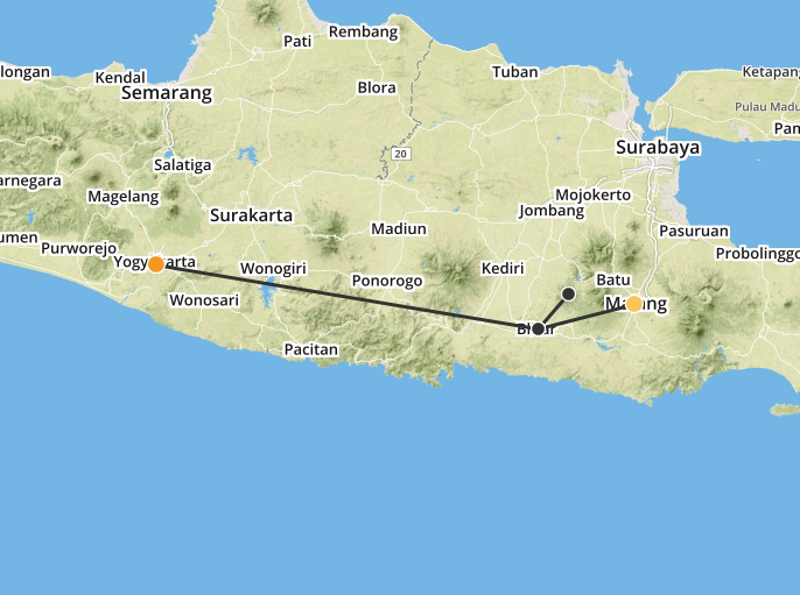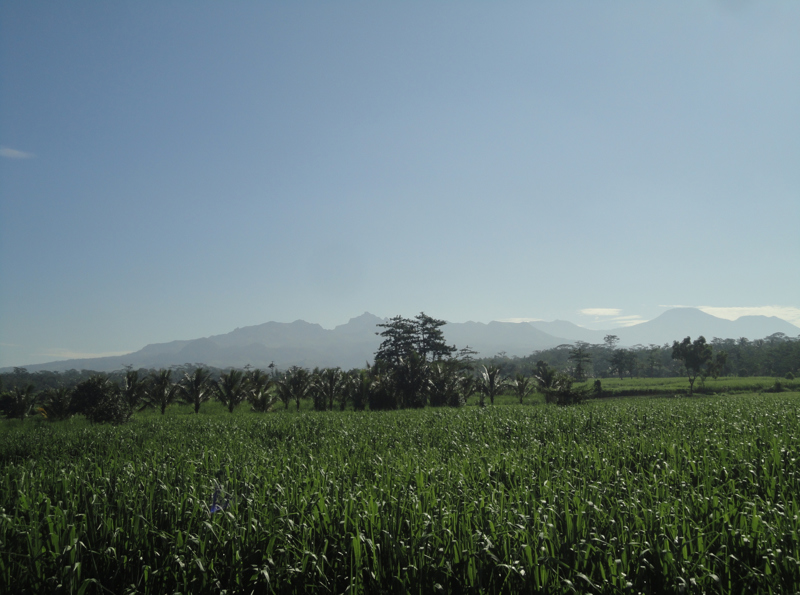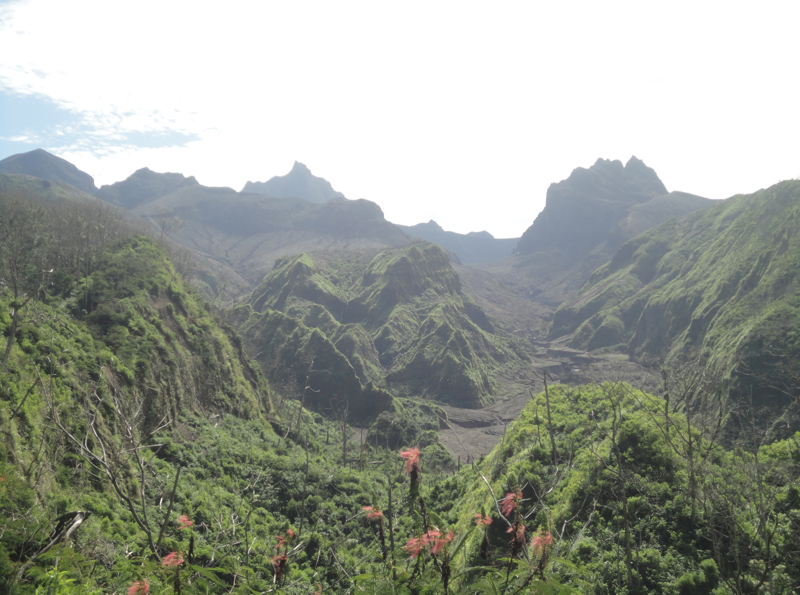New Zealand '14
The train from Malang to Blitar was not recommended in the Lonely Planet. I have yet to discover why because I had a more than decent train for an extraordinary price. Yes it was packed, but at least everybody was sitting at the assigned seats and there weren’t more people than there were seats so I didn’t see the problem. Moreover, what do you expect of a two and a half hour trip for 39cents? Later on I found out that this train was the exception and the next day’s was a more normal €14,00 for five and a half hour to Yogyakarta. The atmosphere in the train is pleasant and cheerful. Everybody is talking and laughing with each other which is completely different from what you normally get. Tomorrow I will find out if I was in the “Happy Cabin” or if it is always the case. Something that caught my attention was that instead of weapon stick or gun, the Railway Police wanders around with a knife on his belt. Very interesting to say the least.
There are a few cities in the world that do not appeal at first sight, but that will grow on you during your stay. Amman, the capital of Jordan, is a city like that. Blitar is the same. The first impression is dull, people do not smile too much and there are not too many buildings or squares that stand out. To find it’s true beauty you actually got to go into the country side. I guess that does actually not say too much about the city itself. I spend my night at the Tugu Blitar, a hotel from the 1850’s with a story and one of the only two building left from the Dutch times. Blitar is known as the town where Sukarno’s tomb lays. Therefore tourists from all over Java and the rest of Indonesia come to visit the town and Sukarno and his wife used to be regulars at the Hotel Tugu Blitar. The walls are decorated with his images and you can take place behind his old desk.
I am a horrible negotiator when it comes down to bargaining products and services, but as I was
robmerwe
15 chapters
Your country has the big dick
February 16, 2015
|
Blitar
The train from Malang to Blitar was not recommended in the Lonely Planet. I have yet to discover why because I had a more than decent train for an extraordinary price. Yes it was packed, but at least everybody was sitting at the assigned seats and there weren’t more people than there were seats so I didn’t see the problem. Moreover, what do you expect of a two and a half hour trip for 39cents? Later on I found out that this train was the exception and the next day’s was a more normal €14,00 for five and a half hour to Yogyakarta. The atmosphere in the train is pleasant and cheerful. Everybody is talking and laughing with each other which is completely different from what you normally get. Tomorrow I will find out if I was in the “Happy Cabin” or if it is always the case. Something that caught my attention was that instead of weapon stick or gun, the Railway Police wanders around with a knife on his belt. Very interesting to say the least.
There are a few cities in the world that do not appeal at first sight, but that will grow on you during your stay. Amman, the capital of Jordan, is a city like that. Blitar is the same. The first impression is dull, people do not smile too much and there are not too many buildings or squares that stand out. To find it’s true beauty you actually got to go into the country side. I guess that does actually not say too much about the city itself. I spend my night at the Tugu Blitar, a hotel from the 1850’s with a story and one of the only two building left from the Dutch times. Blitar is known as the town where Sukarno’s tomb lays. Therefore tourists from all over Java and the rest of Indonesia come to visit the town and Sukarno and his wife used to be regulars at the Hotel Tugu Blitar. The walls are decorated with his images and you can take place behind his old desk.
I am a horrible negotiator when it comes down to bargaining products and services, but as I was

aware of the fact that renting scooters is a bit more expensive in Java compared to Bali I do think I managed to get a good price for my half day rental. My train leaves that afternoon at 16:30 and I think this young man might finally be growing up because I had no troubles at all with waking up at 6:30 to go and see where I came for. In Malang we had failed to go and see Mount Bromo. The price of the guided tour to the top of the mountain were abnormally high and therefore I want to go and visit the Gulung Kelud. The Gunung Kelud is one and a half hour away by motorbike and according to the Lonely Planet it is: “One of Javas most active, accessible and rewarding volcanoes to visit, with a plunging crater,

steaming vents and a small crater lake”. The book is from 2013 and about one thing it was right, the other aspects were more difficult to judge. In 2014 the Kelud erupted for the second time in 7 years and the tunnel, crater lake and steaming vents are either no longer there or atleast no longer visible from as far as the path is safe. It definitely didn’t destroy my experience, because I only found out about this after coming back from my ride. Driving in the early morning over the small roads with rice paddies on both sides and Java’s volcanoes on your right dark with sun in their back isn’t the worst thing I have experienced so far. When I reach the embarked area and pay my entrance fee there are almost no permanent houses left anymore. A pleasant rarity as often every Indonesian house seems to be built along the main road. After 10 minutes I catch a first glimpse of Kelun and not long after that I look out over a beautiful green valley stretched out down a cliff on my right. The path the lava has left behind during the last eruption is unmistakable. The road becomes steeper and once I get to the point to get off my bike I am happy I left that early. In Asia, as many of you would know, Western people are a tourists attraction for locals, especially for local tourists. I don’t mind it, it is always a different person and for him or her it doesn’t happen every day and they don’t realise apparently that you go on the photo all day. That doesn’t mean I can’t appreciate it when it is relatively quiet. The path we take to get to the end was obviously a road before. Now it looks more like a road in Syria or Iraq that has seen too many wars. Sooner than I expected there comes an end to the trail and we look out over the amazing valley. Absolutely stunning, but according to the Lonely Planet you would reach the lake via a tunnel. I even thought I was confusing it with a different volcano, but later, indeed, I found out what happened.
On my way back I stop by at Sukarno’s mausoleum. I had been there the day before, but my camera ran out of battery. In general nobody really minded me being there, which was good. There were only a few faces that kept eyeballing me. Young men, groups of young girls, an elderly couple, a lost

Christian, religiously involved people, everybody was represented on the side of his grave and wanted to make a selfie. The guard walks up to me and asks me if I want to go on a picture with his grave as well. I pass. It feels awkward. A man gets up and salutes to the Indonesian flag. Another holds his hand against his chest. It is a great way of people watching. They are doing the same thing, but I have shut myself off from that. Back at the hotel I speak with the friendly receptionist about my day. He talks to me about the change in scenery around the crater and tells me that until last year it was full of monkeys at the volcano. They fled, as animals do in these situations. Whether they would come back people didn’t know. Time will show. I tell him that I think it is a good thing that Indonesia is an independent country now. I also tell him that, although it is logical, there were a few odd looks that didn’t make me feel good. A very good conversation develops. “That has passed. We live now. We love having Dutch people around. That was the generation of my grandfather and of your grandfather. What do we have to do with that.” That is true and I tell him that finding out more about the history of the Dutch East Indies is also part of my trip and that my generation doesn’t know too much about it, although I think we should. “But I look at it positive”, he says. “I only tell people the positive because I don’t want to look at the negatives. They are no good anyway.” “You are right”, I tell him, “but shouldn’t we know about the past?” “What has passed, has passed. We live in this world now”. He makes me smile. I love his positive mentality and the way he optimistically looks into the world. Then I ask him if he has kids, which he does. “Now if you go with your children to Surabaya and they see a statue of an Indonesian soldier with the dead Japanese, Dutch and British soldiers lying at his feet. What do you tell them?” “I will tell him the story of course and tell him the history and then tell him that the past is over and that we can be happy to live in this world where everybody should live together.” It wasn’t the first time, but I then quoted my old music teacher from high school, Mr. van der Graaf. For some dubious reason we didn’t pay a lot of attention in class that day. Now I don’t understand that, learning to play an instrument should be fun and I often regret not having the patience to do so. He asked us what class we liked best. I don’t recall the answer. Then he asked us what class we liked least and a few girls on the right in the front of me answered: “history”. “Really?” Mr. van der Graaf asked. “Why?” “Because it isn’t relevant anymore, it has all passed”, the girls said. To which he answered: “Who understands history understands today and maybe even tomorrow.” We have to know what has happened and learn from it I tell the receptionist. He smiles and agrees. Two guests walk to the reception for the check in. I grab my bags and before I leave for the platform filled with Sukarno fans, more than one has bought his t-shirt, he steps away from his desk and shakes my hand. “That was a great conversation. Don’t forget me, because I won’t forget this either. My name is Odick, like the Dutch dick.” “The Dutch dick?” I ask confused. “Yes the very big ones! You have one very big one to protect you from the water. That is why for me you are heroes, you are not worried”. “Oh dijk (!) (pronounced dike).” “Yes Dijk, my name is Odick.”
That last part was not meant mean at all, but it was magnificent. Plus it was great to speak in English with such an optimistic character. I will remember Odick for sure. This is why I travel….
1.
Border Town
2.
(Re)start Christchurch
3.
Catching a ride to Queenstown
4.
Milford's Gray Beauty
5.
Kiwi Easter
6.
New Devon
7.
Wellington's own
8.
Where you going cuzzy!
9.
Republic of Whangamomona
10.
Wet Asian Cup experience in New South Wales
11.
Echo Beach 8 years later
12.
Battle of Surabaya
13.
Your country has the big dick
14.
Central Java’s Karaoke
15.
Cool breeze and clean feet
Share your travel adventures like this!
Create your own travel blog in one step
Share with friends and family to follow your journey
Easy set up, no technical knowledge needed and unlimited storage!